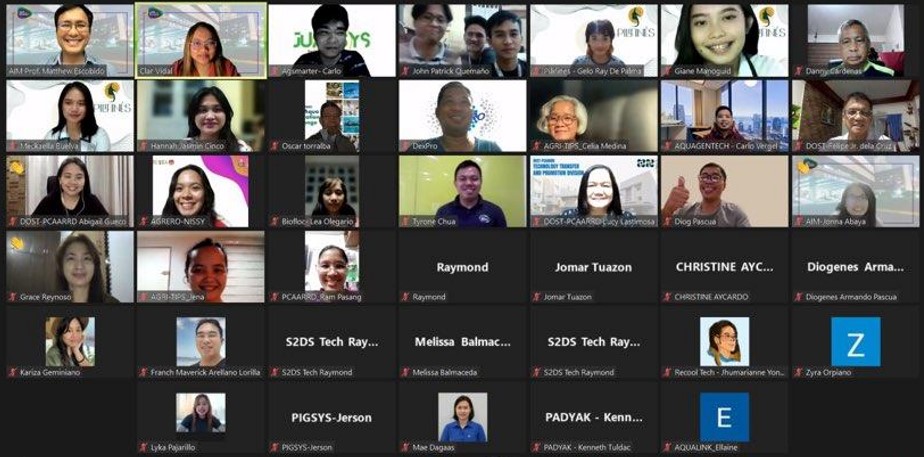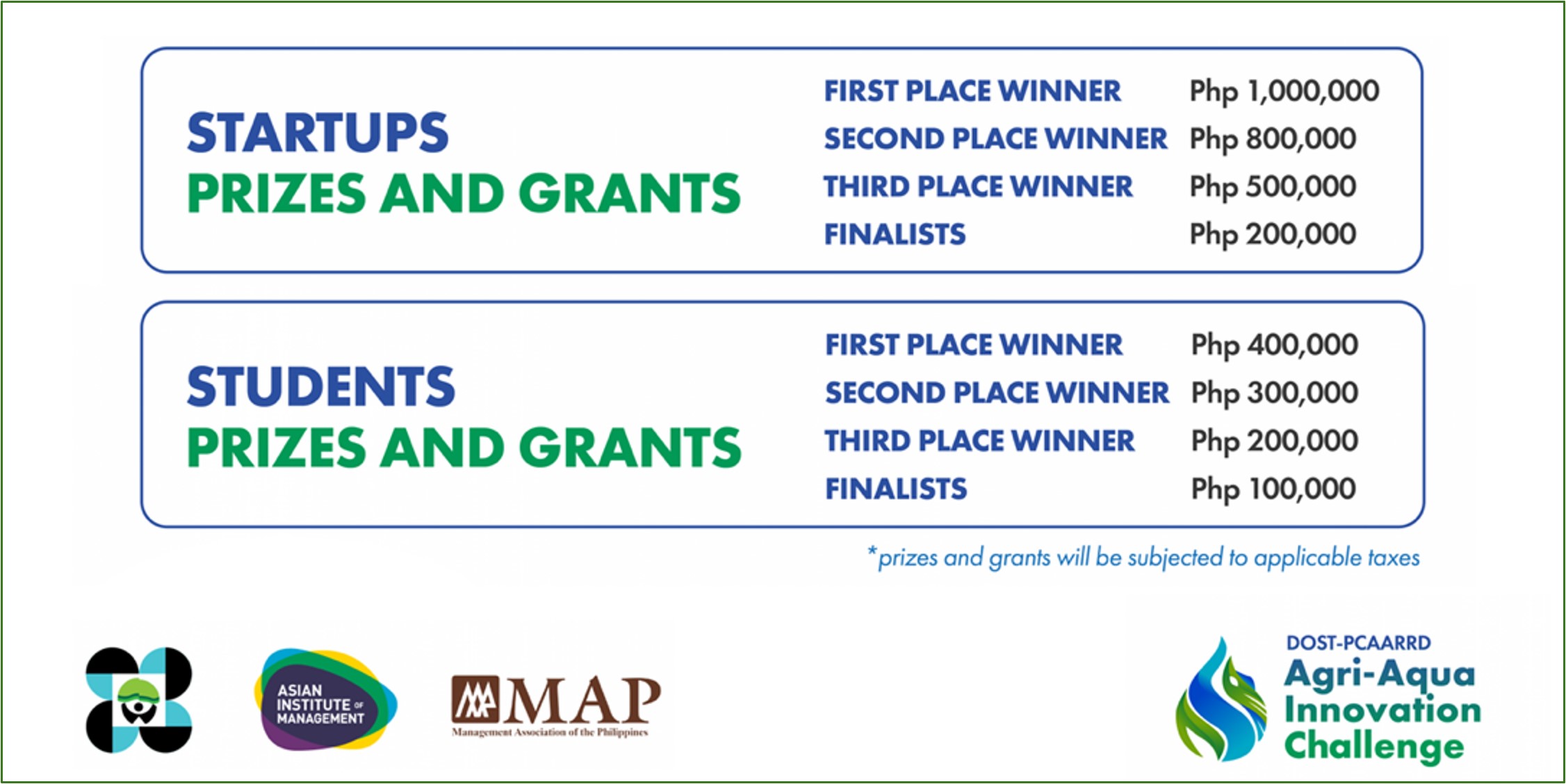
Following the two-day Pitch Feedback Session held from June 23 to 24, 2022, 20 startups of the professional and student categories of the 1st Agri-Aqua Innovation Challenge had advanced to the second phase of the competition that would focus on product iteration and business traction.
The 1st Agri-Aqua Innovation Challenge is a project implemented by the Philippine Council for Agriculture, Aquatic and Natural Resources Research and Development of the Department of Science and Technology (DOST-PCAARRD) in collaboration with the Asian Institute of Management (AIM).
The first batch of participants of the Challenge consisted of 40 startup and student teams who presented before the nine-member panel of judges composed of representatives from DOST-PCAARRD, AIM, and Management Association of the Philippines (MAP). The finalists were evaluated based on the viability of their technology as a business, its market relevance, and the product creativity.
Involving Filipino entrepreneurs and students, the Innovation Challenge seeks to develop a more progressive agri-aqua industry. Selected professional and student startup finalists would undergo a four-month training session with top industry experts to increase the value of their technologies, services, and business models. Each finalist receives a seed fund of P50,000.00 for the professionals and P25,000.00 for students in support of accelerating their S&T innovation for the next business pitching and demo session.
The top 10 Professional Startup Qualifiers are the following:
- AgriTIPS invented an app that integrates science-based information to produce recommendations about what kind, when, and how much insecticide to use to avoid misuse of pesticide. This is anchored on the belief that theory and practice are connected by accessible information.
- Dali Innovations, Inc aims to design and build solutions that can bring a positive impact on society by pursuing technological and sustainable innovations that can uplift the lives of people in small communities. It features V.O.R.T.Ex, a vertical off-shore recyclable turbine for exergy, that seeks to light up fishing communities that have no electricity.
- FarmBox is a social enterprise that aims to improve the lives of local farmers by producing farm boxes containing the necessary farming supplies and services to ensure adequate supply, cost control, and the acquisition of high-quality inputs.
- FiberTech Enterprises provides mechanized solutions for the postharvest processing needs of fiber crops. It features mechanized alternatives to stripping and pressing of karagumoi and buri fibers and the cutting and carding of abaca fibers, which have not yet been offered in the current industry.
- INSIKLO is an innovative, science-based, and sustainable upcycling venture that harnesses insects’ potential to transform organic wastes into high energy and protein-rich feed that is very suitable for livestock and aquaculture production while producing organic soil conditioner (frass).
- Kamino Algae Technologies, Inc. is a local expert in microalgae biomass that aims to sustain industries and communities through ZINAYA Algal Paste, a high-density microalgal concentrate that focuses on quality control to minimize bacterial contamination and maximize microalgae cell growth.
- MakilingTek Inc. is a spin-off company of the University of the Philippines Los Baños that commercializes HormoGroe®, a microbial-derived plant growth regulator (PGR) composed of plant hormones such as auxins, cytokinins, and gibberellins.
- Shiftech Marine provides custom marine battery packs and cost-effective digital solutions and tools for the fishing industry. The battery packs are cost-effective and suited for marine use as they are waterproof, ruggedized, and fit for marine applications.
- UPROOT Microfarm Systems aims to bring farming to cities through its product, Controlled Environment Agriculture with IoT, which helps automate the growing processes, giving greater control over important factors affecting food production and tracks data points to provide the exact temperature, humidity, CO2, pH, proper dosing, and unique light recipes that increase vitamins and nutrients for a variety of crops.
- Waste4Good Technologies is a social enterprise aiming to solve the waste problem in the country. It features the Waste4Good Planting Kit with the Compost Activator Solution (CAS), a complete set of planting materials for urban farming that offers faster decomposition and utilization of leachate fertilizer as fast as three days compared to the slow solution offered by vermiculture, which can take one to two months.
Top 10 Student Team Start-ups are:
- Aqualink of the Batangas State University features a smart-farming product that is integrated with sensor technology composed of IP cameras and various sensors for monitoring and data acquisition; provides data analytics composed of a dashboard for insights about fish farms and serves as a decision support system and optimization of aquaculture management, and offers an insurance scheme under premium subscription partnered with established insurance providers effective during natural calamities.
- ARCHIE of Saint Louis University is an efficient, ecological, and cost-effective insect-control agricultural robot that lets farmers manage insect pests through an on-call agri-robot service instead of the backpack sprayer.
- FreshBox of the University of Science and Technology of the Philippines is a transportable storage box that can maintain and monitor the temperature and humidity of the fruits and vegetables. It has an active system that can maintain the temperature and humidity inside the box to maintain the freshness and the quality of the fruits and vegetables while on transport.
- I-Sense: A Smart Meat Quality Detector using Convolutional Neural Network of LORMA Colleges is a smart meat quality detector device that applies Convolutional Neural Network algorithm which accurately detects the quality and freshness of meat sold in the market.
- JAmp-WSSV System of the University of Santo Tomas is a diagnostic kit that detects the target pathogen, white spot syndrome virus (WSSV), by amplification of a target sequence at isothermal conditions for an hour.
- Pilifines of Bicol University is a product that features a beauty bar soap that uses Manila elemi derivatives, particularly elemi oil, resinoid, and hydrosol as the main highlights of the product.
- Pilipiniyog of the Technological Institute of the Philippines is a coconut dehusking machine that can dehusk a coconut with ease.
- ReCool Smartbox of University of Science and Technology of the Philippines is a smartbox that aims to address the fishermen and fish vendors preserving the fish through a smartbox that operates using a solar and lead-acid battery, which is cheaper for artisanal fishermen. It features a thermoelectric module that maintains the box temperature at below 5 degrees Celsius.
- S2DS Tech (Seaweed Solar Drying System) of Western Philippines University is an enclosed drying system that delivers and promotes cost-effective technology in improving the process and quality of dried seaweeds to support local seaweed growers and by encouraging them to opt into more user- and environment-friendly technology.
- Urban Vertical Ulang Farming and Hatchery of Laguna State Polytechnic University is a technology that aims to produce Giant fresh water prawn using low-cost Urban style aquaculture and produce low cost but quality post larvae.

The finalists will compete for the grand prize of P1 million for the professional category and P400,000 for the student category. Winners will be chosen based on their final business pitch during the Demo Day on November 9, 2022.
